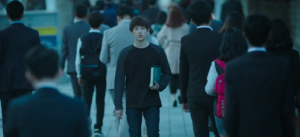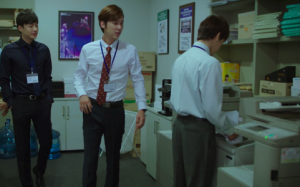SYNOPSIS: Geu-rae has just started to experience the hardships upon his internship at One International. The interns desparately want Geu-rae as their partner for their presentations because they would be easily able to stand out from him in front of the employers. Sang-shik, although a stern and prideful man, is willing to defend and support his subordinate even if he lacks experience. Being teased by the interns and having high expectations from his superiors, Geu-rae is determined to challenge himself and to overcome his obstacles at work. Geu-rae holds on to the words and advices of his peers that will motivate him to produce better results.
I will argue that Geu-rae’s experience as an intern for One International is, in some sense, analogous to North Koreans transcending into South Korean society. Geu-rae is a man of great character and integrity, but just like any North Korean struggling to survive, “access to education and individual opportunity is scarce for some and often not based on merit” (Han 2015, 127).

Geu-Rae’s has the opportunity to do something better for his life when his connection offers him an intern position at a large establishment. Just like any other North Korean that defects from DPRK towards ROK to improve their standard of living, ROK “attempts to nurture the integration of North Korean refugees into South Korean society” (Epstein and Green 2013, par. 1). Being unfamiliar and isolated in the office culture, Geu-rae is having difficulty getting through his internship when treated poorly by many of the coworkers who despise him. It probably comes from Geu-rae’s fortune of having a prestigious opportunity that rarely comes handed to just high school graduates, whereas others worked very hard to get to where they were through post-secondary education and applicable work experiences.

The staff attain the same attitude as South Koreans who “are unwilling and unable to accept the different cultural and poor economic backgrounds of NKRs” (Han 2015, 134). The status-quo appears to be that merit determines the success of workers. Thus, when Geu-rae suddenly comes out of the blue, he is unaccepted and excluded by the majority of the staff for his lack of academic accomplishments.

Geu-rae is quite similar to the NRK’s who “live on a minimum income, both materially and in terms of social participation. In particular, they experience discrimination and prejudice throughout their social activities” (Han 2015, 128). Such poor treatment might cause Geu-rae to give up his hope of having a better life for himself, and may be tempted to leave the company. However, Geu-rae is not the one to give up so easily, and instead wants to apply his own personal skills he attained in his past to different challenges.

Through reflection of this episode, we can see that regardless of Geu-rae’s background, the upper-management and a few of his acquaintances are willing to treat him equally with the other interns. Although it’s not an easy time for the protagonist, Geu-rae is willing to continue learning and growing so that one day he may be a strong asset to the company.

Question: Will there always be this internal conflict between the DPRK and the ROK, or can they learn to forgive and forget the past in order to grow as a nation?
As the viewers easily sympathize with Geu-rae’s story, it’s not as easy for the other interns to understand his situation. In such a case, how can we realistically change the interns’ willingness to be more inclusive of Geu-rae?
Photos are screenshots from the drama, no copyright infringement is intended.
Work Cited
Epstein, Stephen, and Christopher Green. “Now On My Way to Meet Who? South Korean Television, North Korean Refugees, and the Dilemmas of Representation.” The Asia-Pacific Journal | Japan Focus, 2nd ser., 11, no. 41 (October 13, 2013). Accessed May 24, 2018. doi:10.3726/978-3-0353-0782-5/23.
Han, Gil Soo, and Taylor & Francis eBooks A-Z. 2015;. Nouveau-riche nationalism and multiculturalism in korea: A media narrative analysis. Vol. 31. New York, NY: Routledge.
Kim, Won-seok, dir. Misaeng. Number 3 Pictures, 2014. https://www.netflix.com/watch/80165296?tctx=0%2C0%2C2ccd12e1-70d7-46d9-8aae-7ac139b241fa-124328052%2C%2C.
Hi Jordan,
I really enjoyed the connection you made between Geu-rae’s difficulties in being accepted into the company with how North Koreans are segregated from Korean society. I think to answer your question, I think to be more inclusive of Geu-rae, more people need to give him an opportunity to prove himself. People need to realize that place of origin, education or class is not what makes a person be of value to a company, but how hard they work, how well they work, and how dedicated they are to the company. This can be applied to North Koreans being accepted into South Korean society. We need to hold back our stereotypes and give people a chance to prove their ability and character instead of having bias right away.
To answer your question regarding how Jang Geu-rae’s coworkers can be more inclusive to him, Jang needs to prove himself much more than others. What I mean here is that he needs to show others that he can be on the same level or even higher than the other interns. When he gains the trust of the upper management through successful results, it will only be natural for his colleagues to be more inclusive to him as they will want to gain success off him. To relate this to the North Korean situation, the North Korean refugee must work and achieve a high standard of success to prove themselves. When the South Koreans see that the North Korean refugees are able to play a crucial role in their society, then the South Koreans will accept the North Korean refugees. Similarly, when someone ends up being valuable to their society and is required for the society to thrive, then they will be respected and incorporated since they are needed. At that point, it will not matter whether they were previously discriminated or not since they are of use.
As an intern hired through a connection, Geu-rae’s working environment fills with discontent and disrespectful. To break this bias, Geu-rae has to work harder without any complaint. He memorized the whole dictionary in one day which really impresses the manager. When I see from this point, trying to earn other’s respect is not an easy thing. If your talent has not been noticed, then show them to the upper-management by any chance. After he gains the recognition from upper-levels and really proves his capability, other interns will respect him and treat him equally with others.
In Geu-rae’s case, I think for other interns to be more inclusive to him Geu-rae must work much harder than other interns. Especially since Geu-rae is considered as someone who is “less” qualified, he has to show his capabilities and willingness to overcome not only the standard of the company that he works for but also his colleagues’ attitude toward his qualifications and office culture.
North Koreans who defect from DPRK face almost the same situation in which they are rejected by South Korean society. From the dialect the defectors use to whatever “qualification to work in South Korea” that they may bring, the defectors are vulnerable to all kinds of exclusions. For example, since their qualification to economically integrate into South Korean society is likely to be “insufficient”, they put more effort than average South Koreans to show that they can work as well as average South Koreans. This extra effort may include showing up earlier than they are supposed to at work to demonstrate their willingness to work and diligence.
It is through such extra effort Geu-rae and North Korean defectors are able to overcome whatever discrimination they face whether the discrimination is due to education or different backgrounds.
Hi Jordan,
I agree with your comparison with Geu-rae and North Korean Refugees. Everything about Geu-rae screams ‘outsider’ which is a large reason behind the discrimination he encounters in the workplace.
To answer your question, companies who have had similar issues with their employees often try team building exercises or work retreats. This allows everyone to get to know each other. By allowing a more personal relationship between co-workers it generally prevents or stops workplace discrimination. However when situations escalate like with the octopus-squid-check incident, the employees would normally report to HR (human resources) who would deal with such issues. However, I am unsure if Korean companies have HR or if they have something similar or if they don’t have anything. Without that kind of built in system to deal with such issues it would put all the pressure on to the employees. Forcing them to prove themselves by working harder and longer than the other employees. Which considering the work hours displayed in the drama would most likely cause massive health issues.
Jordan, I appreciate your incorporating the previous week’s reading and the episode. It is certainly interesting that you are linking the case of Geu-rae with the situation of North Korean refugees. And it is true that inclusion-exclusion is happening in both cases.
You could also (at least briefly) mention how these two cases are different, emerging out of very distinct contexts. Without acknowledging difference, phrases such as “just like” may sound a little strong.
As you mentioned in your essay and Martin, Yutian, and Seung Ki pointed out in their comments, discrimination against Geu-rae comes from the fact that he got the position through his connection, which must be seen unfair to those who have no idea about his background. Koreans (still to some degree) believe that their hard work will pay off, and when they do see cases where people are hired by their connection, they consider it as unlawful, unfiar, and against social trust. So Geu-rae’s coworkers’ reaction is not abnormal, but understandable. Maybe asking people to change, we could ask for insitutional measures that support people like Geu-rae for whom finding a decent job is almost impossible.
Hi Jordan,
I agree with what everyone has put out so far with Geu-rae’s character in the drama, and how we, as viewers, have caught a glimpse of him as the “Other” or the “outsider”; similar to how the public views North Korea in the media, with your comparison. As a viewer of the drama, we see Geu-rae working and adapting to office life and politics: with his other fellow colleagues and interns, there is so much tension foregrounded in the plot thus far.
To answer your question: In order to receive support when others have preconceived notions or against one’s views, would take more effort and perhaps, passion to prove yourself worthy of accomplishing the tasks to avoid inconveniencing others. With the help of technology, this would greatly help with some of the “how-to-do’s” that one could explore. To reflect from class lectures, since South Korea places much emphasis on the collective identity, I do have to agree with Michelle’s approach to team building, as the place to start. Perhaps another solution is taking a step back and reflecting on what it was like landing the first job, and placing yourself in their shoes, to acknowledge those struggles through previous work experiences. And through this exchange, this could help each other thinking about how we can actively help each other through the roles and tasks.
Hello Hellen,
I really enjoyed reading your conclusion that the work of both ‘blue’ and ‘white’ collar employees are essential to having a properly functioning company. And that South Korea suffers from a false assumption that a ‘blue’ collar job is less important than a ‘white’ collar job. I have found this to be the same case in Canada, but to a much lesser degree. I wonder if this is common prejudice throughout the world?
Here are my answers to your questions:
Question #1
I think that in order to change the perception of ‘white’ and ‘blue’ collar jobs, one needs to focus first on ‘blue’ collar jobs. This is because they are the ones whose image is seen as less than favourable compared to ‘white’ collar jobs. And I believe their are three ways to change this:
1. Begin early, by promoting the image of ‘blue’ collar jobs to children through: a) field trips (ex. a day at a factory) b) career days featuring ‘blue’ collar worker speakers c) have extra classes (starting around middle school) featuring skills like woodworking, electronics, and even metal working. By providing an early introduction to ‘blue’ collar jobs more people will be interested in it and possibly pursue such career options. And if not, at least children will learn to have respect for those that do choose to be ‘blue’ collar workers.
2. Promote ‘blue’ collar jobs in the media. For example, have a K-drama that focuses primarily on Blue collar jobs. Or have guest hosts on a show from ‘blue’ collar workers. By showing the positives of being a ‘blue’ collar worker to the media, it will influence a large amount of people in Korea.
3. Lastly, make sure companies pay their employees from both ‘blue’ collar and ‘white’ collar jobs equally or at the very least closer to each other. People are naturally drawn to jobs with higher pay or lots of benefits. If you make their pay similar their will be less of a gap not only financially but also socially.
Question #2
I think the government could provide incentives to large companies that provide fairer wages and enforce high-standard safety regulations to those working in their factories. Through some sort of financial or political agreement. However, this might not be enough if the government or company is too corrupt to enforce this measure. Therefore, it is important that Korean citizens are informed of bad working conditions and unfair wages in these companies—in which they can make informed decisions to not support such companies in order to fore those companies to change their ways. Not with a strike but with a boycott of their goods or services.